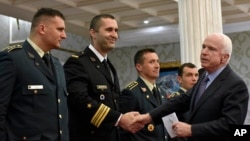Increased U.S. and European engagement in the Western Balkans will be critical to countering an increasingly assertive Russian in the region, Republican Arizona Senator John McCain told VOA Wednesday.
McCain, chairman of the Senate Armed Services Committee, made the comments shortly after returning from a tour of the region, which included a stop in Montenegro, whose U.S.-backed accession to NATO has been vigorously opposed by Russia.
“Some age-old, some new tensions in the region require our attention, and my concern is that as our attention has been diverted to Ukraine, the Middle East, to China ... and it’s very clear the Russians are trying to extend their malign influence in the region,” he said. “The attempt at a coup in Montenegro is a graphic example of that.”
A provocation for Russia
Russia has described Montenegro’s NATO membership as a provocation, because of the country’s geographical proximity to Russia. The Kremlin has long seen the Balkans as inside its sphere of influence.
Further evidence of Russian influence in campaigns in Serbia, Macedonia and Kosovo, McCain added, are “a result of a lack of American and European leadership.”
“We fought a conflict there. There was enormous loss of life, and we seemed to have walked away in recent years,” he said.
The European Reassurance Initiative, launched by the Obama White House in 2014, represents the kind of joint military-diplomatic strategy that McCain wants the U.S. to replicate throughout southeastern Europe. Under that program, which boosted the U.S. military presence in Poland and the Baltics, the U.S. plans to quadruple military spending in Europe to $3.4 billion in 2017.
“In the Baltics we are doing some very interesting and useful things,” McCain said, referring to U.S.-NATO troop rotations, the stockpiling of military hardware and the formation of a rapid-reaction force designed to counter Russian military aggression, such as Moscow’s 2014 annexation of Crimea. “And yet, to a large degree, we seem to be ignoring arguably the most volatile place in Europe.”
Macedonia’s importance
He called the “very dynamic and explosive situation in Macedonia” just one example of where increased U.S. advocacy and mediation will be vital to de-escalating regional tensions.
“It’s not in anybody’s interest to the see the breakup of Macedonia. No one should ever, ever forget that two world wars were spawned at a bridge in Sarajevo, with the assassination of [Archduke Franz Ferdinand of Austria],” he said. “...I’m not predicting a world war or even conflict, but I am saying the tensions are rising and the situation is deteriorating.”
U.S. and Western allies, he said, should also stabilize the region via the soft-diplomacy of aid packages targeting increased employment, youth engagement and counterterror efforts.
A balance in Serbia
Despite increasing political power consolidation in nearby Hungary and Bulgaria, McCain said Prime Minister Aleksandar Vucic's victory in this month's presidential election in Serbia, which has long-established ties to Russia, means the newly elected leader will need to strike a diplomatic balance.
“He [Vucic] knows the citizenry is much more pro-European than it is pro-Russian, and I don’t think he wants to be perceived as being too closely aligned with Russia,” McCain said. “I found my conversations with him productive.”
Trump, Russia ties
Asked about an executive branch investigation into ties between U.S. President Donald Trump and Russia, McCain said, “There will be more shoes to drop before this is over.”
On May 8, a subcommittee of the Senate Judiciary Committee will hear testimony regarding the issue from Sally Yates, former acting attorney general, and James Clapper, former director of national intelligence.
That subcommittee will be headed by Sen. Lindsey Graham, a Republican from South Carolina, one of McCain’s closest political allies.
This report was produced in collaboration with VOA’s Serbian Service.









